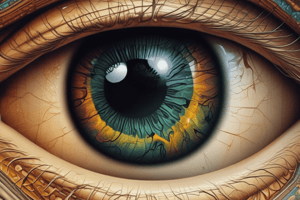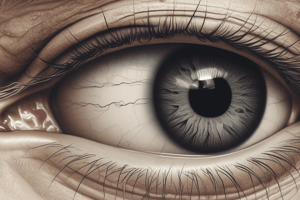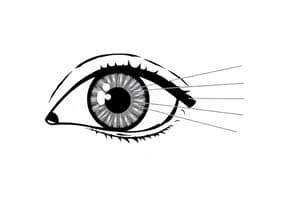Podcast
Questions and Answers
What does a result of 20/20 on a Snellen chart indicate?
What does a result of 20/20 on a Snellen chart indicate?
- The patient can read the “20” line at 20 feet. (correct)
- The patient can read the “20” line at 50 feet.
- The patient can read letters only at 10 feet.
- The patient has impaired visual acuity.
Which test is specifically designed to assess the pressure inside the eye?
Which test is specifically designed to assess the pressure inside the eye?
- Visual acuity test
- Slit-lamp examination
- Tonometer measurement (correct)
- Gonioscopy
What is the primary purpose of gonioscopy?
What is the primary purpose of gonioscopy?
- To examine the retina for detachment
- To assess color vision
- To check the filtering angle and drainage area of the eye (correct)
- To measure visual acuity
Which of the following is NOT typically assessed during a thorough eye examination?
Which of the following is NOT typically assessed during a thorough eye examination?
What condition is described as oscillating movement of the eyeball?
What condition is described as oscillating movement of the eyeball?
Which examination would assist in diagnosing retinal detachment?
Which examination would assist in diagnosing retinal detachment?
During which test is a thicker contact lens with mirrors used?
During which test is a thicker contact lens with mirrors used?
What could interfere with performing a visual field test?
What could interfere with performing a visual field test?
What indicates a failure in color vision testing?
What indicates a failure in color vision testing?
Which of the following is a standard feature assessed during an ocular examination?
Which of the following is a standard feature assessed during an ocular examination?
What is a potential risk associated with poor glucose control in diabetes patients?
What is a potential risk associated with poor glucose control in diabetes patients?
Which intervention should be prioritized for a patient with diabetes exhibiting compromised skin integrity?
Which intervention should be prioritized for a patient with diabetes exhibiting compromised skin integrity?
Before engaging in strenuous exercise, a diabetic patient should be advised to do what?
Before engaging in strenuous exercise, a diabetic patient should be advised to do what?
Which of the following is advised for patients whose blood glucose levels exceed 250 mg/dL and have urine ketones present?
Which of the following is advised for patients whose blood glucose levels exceed 250 mg/dL and have urine ketones present?
What is a recommended intervention for patients with diabetes to enhance peripheral blood flow?
What is a recommended intervention for patients with diabetes to enhance peripheral blood flow?
How should insulin be administered on days when a patient exercises their arms or legs?
How should insulin be administered on days when a patient exercises their arms or legs?
What should be avoided when caring for the skin of a diabetic patient to prevent further skin integrity issues?
What should be avoided when caring for the skin of a diabetic patient to prevent further skin integrity issues?
What is an important nursing consideration for managing clients with hypersecretion of growth hormone?
What is an important nursing consideration for managing clients with hypersecretion of growth hormone?
Which assessment finding is critical to evaluate in a patient suspected of having diabetic ketoacidosis?
Which assessment finding is critical to evaluate in a patient suspected of having diabetic ketoacidosis?
What nursing intervention is essential when managing a client experiencing hypoglycemia?
What nursing intervention is essential when managing a client experiencing hypoglycemia?
During a health history assessment for a patient with suspected diabetes mellitus, which risk factor should a nurse prioritize?
During a health history assessment for a patient with suspected diabetes mellitus, which risk factor should a nurse prioritize?
When planning care for a patient with anterior pituitary gland disorder, which hormone-related condition should the nursing interventions primarily address?
When planning care for a patient with anterior pituitary gland disorder, which hormone-related condition should the nursing interventions primarily address?
What is the recommended method for cutting toenails in diabetics?
What is the recommended method for cutting toenails in diabetics?
Which action should be avoided to prevent foot injuries in individuals with diabetes?
Which action should be avoided to prevent foot injuries in individuals with diabetes?
What should patients specifically look for when checking their feet?
What should patients specifically look for when checking their feet?
What is an important aspect of foot drying for diabetic patients?
What is an important aspect of foot drying for diabetic patients?
Which footwear choice is least recommended for individuals with diabetes?
Which footwear choice is least recommended for individuals with diabetes?
What is a recommended practice before putting on shoes to avoid injury?
What is a recommended practice before putting on shoes to avoid injury?
What foot care guideline should be followed regarding temperature?
What foot care guideline should be followed regarding temperature?
What should a patient do if they cannot clearly see their toenails?
What should a patient do if they cannot clearly see their toenails?
What does unusual dampness in socks or stockings indicate?
What does unusual dampness in socks or stockings indicate?
Which condition is a likely risk factor associated with inadequate foot care in diabetics?
Which condition is a likely risk factor associated with inadequate foot care in diabetics?
Which type of Kaposi's Sarcoma primarily affects men of Jewish or Mediterranean ancestry?
Which type of Kaposi's Sarcoma primarily affects men of Jewish or Mediterranean ancestry?
What is a primary characteristic of stage one pressure ulcers?
What is a primary characteristic of stage one pressure ulcers?
Which of the following is NOT a common nursing diagnosis related to skin issues?
Which of the following is NOT a common nursing diagnosis related to skin issues?
What treatment options may be included for managing Kaposi's Sarcoma?
What treatment options may be included for managing Kaposi's Sarcoma?
What causes pressure ulcers to develop on the skin?
What causes pressure ulcers to develop on the skin?
Which type of burn involves only the epidermis and presents as pink and dry with possible edema?
Which type of burn involves only the epidermis and presents as pink and dry with possible edema?
In nursing management of pressure ulcers, which responsibility is crucial for reducing the risk of infection?
In nursing management of pressure ulcers, which responsibility is crucial for reducing the risk of infection?
What is the most appropriate nursing diagnosis for a patient exhibiting signs of significant discomfort due to a deep partial-thickness burn?
What is the most appropriate nursing diagnosis for a patient exhibiting signs of significant discomfort due to a deep partial-thickness burn?
Which type of burn extends to the underlying tissues and may require skin grafting for proper healing?
Which type of burn extends to the underlying tissues and may require skin grafting for proper healing?
What is a key nursing responsibility in the management and prevention of pressure ulcers?
What is a key nursing responsibility in the management and prevention of pressure ulcers?
Which of the following correctly describes a superficial partial-thickness burn?
Which of the following correctly describes a superficial partial-thickness burn?
Which type of medication is NOT typically recommended for managing pain associated with burns?
Which type of medication is NOT typically recommended for managing pain associated with burns?
Which nursing diagnosis is most appropriate for a patient presenting with skin peeling and dehydration?
Which nursing diagnosis is most appropriate for a patient presenting with skin peeling and dehydration?
What is the primary treatment focus for a patient experiencing severe itching associated with skin lesions?
What is the primary treatment focus for a patient experiencing severe itching associated with skin lesions?
In cases of burns, which nursing intervention should be prioritized to prevent complications?
In cases of burns, which nursing intervention should be prioritized to prevent complications?
What primary sign should a nurse monitor in a patient suspected of having a malignant skin lesion?
What primary sign should a nurse monitor in a patient suspected of having a malignant skin lesion?
Which of the following treatments is appropriate for managing acute pain associated with skin disruption?
Which of the following treatments is appropriate for managing acute pain associated with skin disruption?
When assessing a patient with burns, which symptom most strongly indicates a potential for infection?
When assessing a patient with burns, which symptom most strongly indicates a potential for infection?
Which pharmacological agent is most commonly used to alleviate pruritus in dermatological conditions?
Which pharmacological agent is most commonly used to alleviate pruritus in dermatological conditions?
For a patient with lesions affecting the gastrointestinal tract, which nursing diagnosis is most appropriate?
For a patient with lesions affecting the gastrointestinal tract, which nursing diagnosis is most appropriate?
What skin manifestation is commonly associated with the malignant tumor of endothelial cells?
What skin manifestation is commonly associated with the malignant tumor of endothelial cells?
What should be the primary goal when managing fluid replacement for a patient with severe skin disorders?
What should be the primary goal when managing fluid replacement for a patient with severe skin disorders?
Flashcards are hidden until you start studying
Study Notes
Eye and Ear Structures
- Significant structures include the eyeball, eyelids, sclera, and pupils, each playing crucial roles in vision.
- Eye functions encompass light reception, focus adjustment, and vision clarity.
- Key components of the ear involved in hearing include the outer ear, middle ear, and cochlea.
Vision Assessment Techniques
- Visual Acuity Testing
- Utilizes the Snellen chart for measuring vision clarity; 20/20 indicates normal vision at 20 feet.
- Finger count and hand motion tests are alternative methods for assessing visual ability.
- Eye Examination Procedures
- Slit-lamp examination provides detailed views of anterior eye segments.
- Color vision testing assesses the ability to differentiate colors, crucial for daily activities like traffic navigation.
- Ophthalmoscopy examines the optic nerve through the pupil to reveal optic disc conditions.
- Ultrasonography is utilized for detecting orbital tumors and retinal detachment.
- Gonioscopy evaluates the drainage angle of the eye using a special contact lens with mirrors.
- Tonometer measures intraocular pressure, essential for glaucoma screening.
- Visual field tests assess peripheral vision, identifying potential glaucoma-related vision loss.
Ocular and Hearing Disorders Management
- Clinical features of ocular disorders may include redness, irritation, discharge, and abnormal pupil reactions; similar assessments apply to hearing disorders.
- Diagnostic assessments involve a combination of physical examinations and specialized tests.
- Medical options for managing ocular issues may include prescription medications, and in some cases, surgical interventions.
- Nursing management encompasses patient education, symptom monitoring, and logistical support for treatment compliance.
Ophthalmic Medications and Their Effects
- Therapeutic effects of ophthalmic medications may include reducing inflammation, managing pain, and controlling intraocular pressure.
- Knowledge of medication types is essential for effective patient education and treatment adherence.
General Assessment of Diabetes Patients
- Recent fluctuations in weight, increased fatigue, anxiety, and tiredness may indicate diabetes-related issues.
- Oral health problems, such as gingivitis and periodontal disease, are common in diabetes patients.
- Cardiovascular issues like orthostatic hypotension, cold extremities, and weak pedal pulses need to be assessed.
- Gastrointestinal symptoms may include diarrhea, constipation, bloating, increased flatulence, and abnormal hunger or thirst patterns.
- Genitourinary concerns could involve increased urination, nocturia, impotence, and abnormal vaginal discharge.
- Neurologic symptoms often observed are numbness, tingling in extremities, and altered pain or temperature perception.
Nursing Diagnosis and Interventions
- Risk for Activity Intolerance is tied to poor glucose control; monitor blood glucose levels before and after exercise.
- Encourage consistent exercise planning and carbohydrate intake prior to exercise to prevent hypoglycemia.
- Prolonged strenuous exercise may necessitate increased food intake at bedtime to prevent nocturnal hypoglycemia.
- Patients should avoid exercise if blood glucose levels exceed 250 mg/dL and urine ketones are present; contact healthcare provider if elevated.
Risk for Impaired Skin Integrity
- Risk stems from decreased sensation and circulation to the lower extremities.
- Regular assessment of feet and legs for temperature, sensation, and any injuries is crucial.
- Maintain skin integrity by using protective measures such as heel protectors and special mattresses.
- Avoid drying agents on the skin and apply moisturizers to prevent cracking.
Smoking Cessation
- Patients who smoke should be encouraged to quit to improve peripheral blood flow.
- Help establish behavior modification techniques for smoking cessation both in and out of the hospital.
Foot Care Guidelines
- Daily foot washing and gentle drying, especially between toes, is essential for diabetic patients.
- Cut toenails after a bath for softness; always cut straight across and gently round corners.
- Always wear shoes or slippers to protect feet; ensure proper fit and check for foreign objects inside footwear.
- Avoid barefoot walking, tight/worn footwear, open-toe sandals, and slip-on shoes.
Foot Care Precautions
- Do not attempt to cut nails without clear visibility; avoid cutting the sides of nails.
- Never apply feet directly onto hot water sources to prevent burns.
Monitoring Foot Health
- Monitor for changes in color or temperature, signs of infection, unusual dampness in socks, and any abnormal sensations in the feet.
Risk for Deficient Knowledge
- Assess healthcare literacy to tailor education on oral hypoglycemic agents and exercise for glycemic control.
- Educate on checking medication expiry dates and the importance of adhering to dietary guidelines provided by nutritionists.
Overview of Endocrine System
- The hypothalamus regulates the release of hormones from the pituitary gland, known as the master gland.
- The anterior pituitary secretes several key hormones including Follicle-Stimulating Hormone (FSH), Luteinizing Hormone (LH), Thyroid Stimulating Hormone (TSH), Adrenocorticotropic Hormone (ACTH), Growth Hormone (GH), and Prolactin.
- The posterior pituitary, made of nerve tissue, stores and releases Antidiuretic Hormone (ADH) for urine production regulation and Oxytocin, which induces contractions in reproductive organs.
Pancreas Functionality
- The pancreas plays a critical role in regulating carbohydrate metabolism.
- The endocrine component consists of the Islets of Langerhans: Alpha cells produce Glucagon, Beta cells produce Insulin, Delta cells regulate Alpha and Beta cell function, and F cells inhibit exocrine function.
Anterior Pituitary Gland Conditions
- Disorders may arise from excessive or insufficient secretion of trophic hormones.
- Hypersecretion of Growth Hormone (GH) before puberty leads to conditions such as Giantism.
Wound Management
- Includes tunneling in significant cases.
- Medication options consist of analgesia, antibiotics, and medicated dressings.
- Surgical interventions may involve debridement and skin grafting.
Nursing Responsibilities
- Focus on prevention and assessing clients at risk for pressure ulcers.
- Reposition patients every 2-3 hours to alleviate pressure.
- Utilize protective devices like egg crate mattresses and heel pads.
Ulcer Management
- Employ aseptic techniques in wound care.
- Administer necessary medications as prescribed.
Possible Nursing Diagnoses
- Acute Pain
- Altered Comfort
- Impaired Skin/Tissue Integrity
- Risk for Infection
- Ineffective Coping
Burn Classifications
- Burns are classified by depth and extent, affecting different layers of tissue.
- Superficial burns affect only the epidermis; exhibit pink, dry skin with possible edema.
- Partial-thickness burns involve the epidermis and dermis, forming fluid-filled blisters.
- Full-thickness burns extend to underlying tissues, potentially exposing fat and muscles.
Signs and Symptoms of Skin Conditions
- Common symptoms include weakness, malaise, fever, chills, rash, redness, swelling, dehydration, and pain.
- Skin may display peeling, pimples, blisters, and color changes like hyper/hypopigmentation.
Management of Skin Conditions
- Fluid and electrolyte replacement may be required.
- Possible pharmacological treatments include analgesics, antihistamines, antipruritics, corticosteroids, and antibiotics.
Skin Disorders
- Abnormal skin cell growth, often seen in sun-exposed areas, can lead to malignant tumors.
- Kaposi Sarcoma types:
- Classic KS affects men of Jewish or Mediterranean ancestry.
- Endemic KS primarily affects individuals in eastern Africa.
- Immunosuppression-associated KS occurs in transplant recipients or AIDS patients.
Medical Management for Skin Cancer
- Treatment varies based on type and stage, including surgery, immunotherapy, chemotherapy, and radiation therapy.
Nursing Management for Skin Cancer
- Monitor for changes in moles, new pigmented lesions, ulceration, abnormal rashes, and nodules.
- Possible nursing diagnoses include anxiety, hopelessness, pain, body image disturbance, and ineffective coping.
Pressure Ulcers
- Develop due to unrelieved pressure on bony prominences, impairing blood flow.
- Areas commonly affected include the head, sacrum, hips, and heels.
Stages of Pressure Ulcers
- Stage 1: Skin intact with nonblanchable redness; may be painful.
- Stage 2: Partial thickness loss of dermis with shallow open ulcers; red or pink wound bed may show intact or open blisters.
- Stage 4: Full thickness tissue loss with possible exposure of bone, tendon, or muscle; presence of slough or eschar may be apparent.
Studying That Suits You
Use AI to generate personalized quizzes and flashcards to suit your learning preferences.




